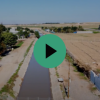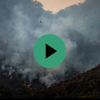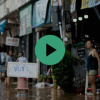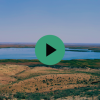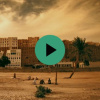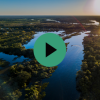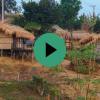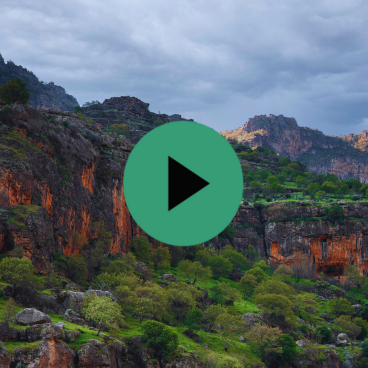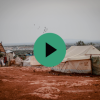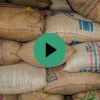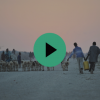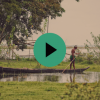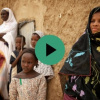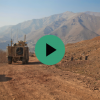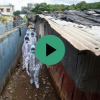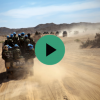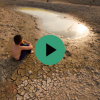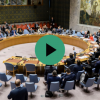
Listen to the podcast in your preferred platform:
Episode 55
Insights from Iraq: Climate-informed mediation and peacebuilding
In this episode, we speak with Nike Löble and Peshtiwan Al Dawoudi from the Berghof Foundation about their work strengthening Iraqi capacities to respond to climate risks across five districts. From the Al Zubair Social Pact bridging divides between displaced persons and host communities, to water-sharing agreements in Kalar, we explore what makes climate-focused dialogues effective in contexts marked by deep-seated grievances and mistrust. We also discuss how to measure impact through outcome harvesting and translate evaluation findings into actionable recommendations for policymakers, practitioners and donors.
Further reading: Weathering Risk Evaluation synthesis for the Iraq Project
Episode 54
Truth under threat: How climate disinformation fuels insecurity
For the last episode of 2025, we're joined by Jonah Thompson, EU Policy Manager at the Center for Countering Digital Hate, who also works on EU policy at Climate Action Against Disinformation (CAAD). Together, we explore the connection between climate disinformation and security—and how it undermines crisis response, erodes trust and fuels security risks in today's geopolitical climate. Tune in as we unpack the threat landscape, the platform mechanics that amplify harmful narratives, recent examples where misinformation outpaced emergency communications and how climate disinformation attempts to weaken institutions like NATO and the EU.
Also, watch the BCSC 2025 session on climate security and disinformation.
Episode 53
Women, Peace and Security agenda at 25: How can gender-responsive climate action be apathway to sustainable peace?
Marking 25 years of the Women, Peace and Security (WPS) agenda, in collaboration with UN Women, this episode explores how gender-responsive climate action can pave the way to sustainable peace. We are joined by Norul Rashid and Japhet William Graham Eichel from UN Women’s Regional Office for Asia and the Pacific, who share insights from across the region and beyond. Together, they examine how climate impacts intersect with gender norms and security challenges, and why women’s leadership is vital in building resilience.
Episode 52
100 days until COP30: Brazil on climate, environment and human security
In this episode, we explore the critical intersection of climate, environment, and human security in Brazil with Laís Clemente Pereira, Analyst in adelphi’s Climate Diplomacy and Security team. As Brazil prepares to host COP30, Laís unpacks the country’s most pressing climate and environmental challenges, from land and water conflicts to environmental crime and extreme weather, and discusses how Brazil’s unique ecosystems like the Amazon and Cerrado shape both risks and opportunities. We examine the strengths and gaps in Brazil’s policy responses, the importance of empowering local and traditional communities, and the country’s evolving leadership role in global climate diplomacy.
Further reading: Report: Climate, environment and human security in Brazil: Response landscape and leadership opportunities
Episode 51
Current affairs: Water diplomacy and climate finance in South and Central Asia
In this episode we're joined by Assem Mayar, independent researcher and Climate Security Expert Network member, specialising in climate change, transboundary water management and environmental security. Assem shares insights on challenges and opportunities in Central Asia and Afghanistan, possible solutions in regional initiatives, decentralised finance and innovative funding mechanisms, as well as what the suspension of the Indus Water Treaty means for wider the region going forward.
Episode 50
Around the world in 50 episodes
This month, hosts Alexandra and Raquel celebrate the 50th episode by looking back continent by continent at the countries and regions that have been covered since 2019 on the podcast. From Kazakhstan to Mali to the Caribbean, guests have echoed the need for intersectional and inclusive research and programming, more and better climate finance in fragile and conflict-affected areas and the importance of local expertise and initiatives. Thank you for tuning in month after month over the last 50 episodes!
Recommended resources:
Climate Security Expert Network
Episode 49
Unrooting environmental crime: Impacts and opportunities for climate and security
Crimes against the environment, from illegal deforestation to hazardous waste trafficking, are not just ecological issues—they’re deeply intertwined with climate and security. In this episode, we explore how thesecrimes fuel conflicts, undermine stability, and impact vulnerable communities. Join us and Fabian Keske from the United Nations Office on Drugs and Crime as we uncover the drivers, trends, and entry-points to combat these crimes from the perspective of the climate and security nexus.
Related resources:
WWF-adelphi joint report "The nature of conflict and peace"
Episode 48
The case for cautious optimism: Community-led approaches in Bangladesh's borderlands
In this episode, we delve into the complexities of fragility in Bangladeshwith our guest Tasnia Khandaker Prova, Lead on Climate Research at the Center for Peace and Justice at BRAC University. We discuss the dynamics of internal and cross-border migration, borderland securitization and the role of community networks in addressing these challenges. As Bangladesh grapples with the repercussions of climate change, especially rising sea levels and increasingly extreme weather events, these pressures serve to compound pre-existing and intersectional vulnerabilities. Tasnia shares insights from her research on Bangladesh's climate-affected borderlands, emphasising the importance of understanding local dynamics and community-led solutions in fostering resilience.
Episode 47
Flipping the script on Yemen: Environment and climate as pathways to peace
In this episode, we explore the complex relationship between conflict and war, climate change and environmental degradation in Yemen with Hisham Al-Omeisy (Senior Yemen Advisor, European Institute of Peace) and Sinéad Barry (Analyst, Climate Diplomacy and Security Programme, adelphi). We discuss the current political situation, how the humanitarian crisis is compounded by environmental degradation and how climate change intensifies key issues related to water and land. With significant cuts to humanitarian aid and changing geopolitical dynamics, funding shortfalls jeopardise long-term peacebuilding efforts, programmes that provide food, water and medical services and economic recovery efforts.
Episode 46
The weaponisation of water in Libya
In this episode, we explore the complex relationship between water, climate change and conflict in Libya. We are joined by independent consultant and researcher and one of the newest members of the Climate Security Expert Network, Malak Altaeb to discuss the reality of water scarcity, the weaponisation of water and the impacts of political legacy and fragmentation on infrastructure and governance. This episode highlights the devastating floods in eastern Libya in September 2023, emphasising the need for sustainable water management and international cooperation. It also underscores the importance of community engagement and long-term vision for water reform and resilience in Libya.
Episode 45
COP29 debrief: Where do we stand on climate finance, action and peace?
As COP29 in Azerbaijan has come to a close, in this episode, our colleague Yosr Khèdr (Analyst, adelphi) joins the podcast to discuss the climate finance negotiations, the new Collective Quantified Goal on Climate Finance, the shortcomings of the final text and what this means for COP30 in Belém. We also dive into what the negotiations mean for fragile and conflict affected countries, the significance of the second Peace Day and other positive outcomes from this year’s COP.
Further links: Climate finance for peace: Event summary | Upscaling peace-positive climate action and climate-informed peacebuilding | Operationalising the Climate, Relief, Recovery and Peace Declaration
Episode 44
It’s called BCSC season for a reason: Convening the community from Berlin to Cali
From key takeaways to a look behind the scenes, in this episode we take a deep dive into all things Berlin Climate and Security Conference (BCSC). One of our hosts, Alexandra Steinkraus, switches hats and joins this episode as a guest along with another key member of the organising team, Laís Clemente. They share insights on how the conference is organised and discuss the role of different actors within the climate, peace and security space, why regional editions are so important, how to ensure geographic diversity and inclusion as a central principal of organising the conference - and more.
Further links:Watch the BCSC livestreamed sessions | BCSC Event Summary | BCSC-Cali
Episode 43
Biodiversity for Peace: Exploring the nature-security nexus ahead of CBD COP16
Related links:BCSC 2024 - Cali Edition | The Economics of Biodiversity | Catalogue: Nature-based Solutions for Peace and Security
Episode 42
42 The answer to everything: Your questions on climate, peace & security
Episode 41
Climate change, peace and progress: Renewable energy opportunities in the Middle East
As a heat dome drives record high temperatures for June across the Middle East and North Africa (MENA), we speak with Ali Nasrallah, a green energy policy and climate security expert to discuss how climate change, rising temperatures and water scarcity are disrupting daily life and infrastructure, exacerbating tensions and contributing to new conflicts. We also speak about the energy transition and progress made -from regional leadership with COP27 and COP28- to national legislation and incentives, as well as the importance of prioritising cross-border programming and partnerships.
Discover the Climate-Security and Peacebuilding Thematic Review
Episode 40
It takes a climate-smart village: Peace-positive approaches for sustainable resilience
In an era of polycrisis, operationalising the humanitarian-development-peace nexus is crucial to create synergies between these areas, rather than looking at them individually. This is specially the case in conflict, fragile and displacement settings. In this episode, we speak with Grazia Pacillo, Senior Scientist and Co-Lead of CGIAR FOCUS Climate Security, about the climate-smart villages project, tools to avoid maladaptation and produce co-benefits, and the pathways through which it contributes to peace. We also speak about conflict sensitivity, the importance of partnerships, and how to build an evidence base for what (doesn't) work in climate security programming.
Discover CGIAR'S Climate Security Programming Dashboard for Climate Finance (CSPDxCF).
Episode 39
Livelihoods: The socioeconomic link between climate change and security
Livelihoods are how the necessities of life are secured. They are a determining factor in many contexts around the world. Many livelihoods are dependent on a healthy environment and a stable climate, making them particularly sensitive to climate and environmental crises. At the same time, they are deeply entangled with social and economic dynamics. As a consequence, livelihoods form a key pathway in the climate-security nexus. In this host-to-host deep dive, we get to talk a bit about our how livelihood security features in our own work, a few experiences and findings, as well as key entry points and recommendations that have emerged from our projects and initiatives at adelphi.
Episode 38
Reconnecting people to their power: Transitional justice and 'cosmovisión' in Colombia
Colombia faces multiple challenges – from a complex peacebuilding process after 50+ years of armed conflict to growing climate impacts on its natural resources. Disputes over land have been at the heart of Colombia's struggle, and while everyone has been affected by it, indigenous and Afro-Colombian communities take a particularly high toll. This episode addresses the importance of considering environmental factors in pursuing victim-centred and community-based approaches to transitional justice and discusses lessons from Colombia for the international humanitarian justice system. Tune in for compelling insights from regional experts Valeria Patricia Moscoso Urzúa (Justice Rapid Response) and Héctor Morales Muñoz (adelphi).
Episode 37
Bringing together diverse stakeholders for an inclusive response to climate and insecurity in Haiti
Haiti is facing a deep security, political and humanitarian crisis and is simultaneously one of the most vulnerable countries in Latin America and the Caribbean to climate change. By adversely impacting livelihoods, food security, water scarcity and health conditions, climate change is exacerbating the current multifaceted and complex crisis grappling the country. In this episode, we bring together the researchers behind the Roots for Peace report to discuss experiences conducting the study, setting up the Haiti Climate Security Working Group and share with the broader research community, the lessons learnt while doing so. We also take a look at the main pathways of climate and insecurity in Haiti identified in the study, recommendations and next steps. Join us for this insightful conversation with Paule Juneau (UNEP Haiti), Beatrice Mosello and Jessica Hsu (Haiti-based researcher & anthropologist).
Episode 36
Climate, peace and security in Yemen: How deteriorating rights of women & minorities affect the whole of society
Since 2014, Yemen has been ravaged by civil war. Our guest today - Yemeni journalist, writer and activist Hind Al-Eryani - brings to light how the war is impacting the lives of women, children, LGBTQ+ communities and religious minorities. Hind explains how women's righs have benn deteriorating in Yemen, and the ways in which this affects society as a whole, for example by hindering climate adaptation. We look into the impacts of climate change on resources, particularly water, and how this fed into insecurity dynamics in the lead up to the conflict, and we discuss whether Germany's feminist foreign policy approach can spill over to women affected by climate change in insecurity worldwide.
Episode 35
Damage control: Unpacking rules and recommendations to protect the environment during armed conflict
So much can be said about how war and conflict disrupt the environment. The effects on human lives are excruciating and long-lived, making environmental protection a priority for human security - even in armed conflicts. On this International Day for Preventing the Exploitation of the Environment in War, we’ve partnered with PAX to put together an episode looking at how rules and recommendations can help protect the environment in armed conflict under international law and create precedents for prevention. Join our guests Wim Zwijnenburg (PAX) and Helen Obregón Gieseken (ICRC) for this exciting conversation.
Episode 34
SPECIAL EDITION: Displacement, migration and how funding can reach those who need it
COP28 is around the corner, and everyone wants to know: how will the conversations around finance for climate-affected states, which officially kicked off in Sharm El-Sheikh last November, pick up in Dubai? In this special edition, we take a deep dive into climate, development and humanitarian funding with Andrew Harper, Special Advisor on Climate Action to the UN High Commissioner for Refugees. Together, we look into the current state of displaced communities around the world, issues standing in the way of finance reaching affected communities, and why finance distribution and use is fairer and more efficient when women, youth and indigenous communities have access to it.
Episode 33
Integrating climate security in peacebuilding: Meet the Weathering Risk Peace Pillar
The Peace Pillar initiative, launched in 2022, is sharing and elevating evidence-based recommendations in mainstreaming climate-security to support sustainable peace processes on the ground. It is guided by the analytical approach of Weathering Risk and translates climate-security foresight and analysis into peacebuilding action where it’s needed the most. In this episode, you will hear from Peace Pillar project partners on how the project is being implemented in Iraq, Yemen, Somalia, Nigeria and the Bay of Bengal.
Episode 32
Farmer-herder conflicts: Climate change is the straw that broke the camel’s back
If you work with climate, environment, development, humanitarian assistance or adjacent areas, you have certainly come across this particular type of conflict. But is climate change and environmental degradation really to blame? Join our hosts, Raquel Munayer and Alexandra Steinkraus, in a chat that looks into the post-colonial elements influencing conflicts between farmers and herders, where climate and environment come in, and what are climate-sensitive options for building sustainable peace.
Episode 31
From advocates to experts: Youth leadership on peace, gender and migration
In this episode, we are joined by Khouloud Ben Mansour, African Youth Ambassador for Peace with the African Union for North Africa and activist for women's and children's rights from Tunisia, to discuss migration, youth and gender in North African and beyond. We cover drivers of migration in the region, gender-based risks, and how to move beyond giving marginalised groups a seat at the table, as well as what it means to be a youth ambassador and the importance of youth as experts and peacebuilders.
Learn more about climate change and security in North Africa.
Episode 30
A sea of opportunity: Climate justice, grassroots movements and interregional cooperation in the Caribbean
In this episode, Christianne Zakour, Advocate for Environmental Governance and Climate Justice, joins us to discuss shared challenges amongst Small Island Developing States, the potential for more interregional knowledge sharing and climate justice. She shares insights from her work and thoughts on the recent landmark UN resolution for climate justice and what this could mean for progress in coming years.
Episode 29
Resilience gone wrong: Maladaptation as a side-effect of neglecting climate vulnerability
Join our hosts, Raquel Munayer and Alexandra Steinkraus, for a conversation on how maladaptation makes communities even more vulnerable, rather than less, to climate change. Insights from Afghanistan, Colombia, Mali and the Pacific illustrate ways that negligence and poorly planned policies can lead to increased climate security risks, bolstered recruitment and support for armed opposition groups, and increased conflict between communities. They also highlight the need for timely action that is climate, conflict and context sensitive.
Find out more: weatheringrisk.org | adelph.it/DangerousClimate
Episode 28
News from the frontline: Why narrative matters when reporting on the climate-conflict nexus
Reporting on the climate and environmental crises is increasingly a risky endeavour – even more so where insecurity and conflict are present. Environmental Journalist and Consultant Peter Schwartzstein spoke about the perils of covering the climate-conflict nexus in places like Syria and Iraq, why concise narratives matter for boosting action, and what he is up to in his upcoming book ‘The Heat and The Fury’.
WATCH:
Episode 27
HoP(ping) into the new year: A 2023 outlook on climate, peace & security
Join us for a conversation with our Heads of Programme (HoPs) for Climate Diplomacy and Security, Janani Vivekananda and Benjamin Pohl, as we reflect on highlights from 2022 – from the launch of the Climate for Peace Initiative at BCSC 2022 to the establishment of the Loss and Damage Fund at COP27 – and identify developments to watch (and be hopeful about) for 2023. All eyes are on actions that will better multilateral cooperation and local-informed action, and drive peace positive climate action.
Videos worth watching: Launch of the Climate for Peace Initiative | Official side event on Climate for Peace at COP27 | Creating a Climate for Peace at COP | Best of BCSC 2022
Episode 26
Revisiting roles: The evolution of climate, peace and security in the UNSC and beyond
In this episode, we speak with Hafsa Maalim, a panel discussant at the November UNSC meeting on climate, peace and security (CPS), to discuss the evolution of its understanding in the Security Council and how increased awareness of the interactions between climate, security and peacebuilding can support the Council to better achieve its mandate. She discusses how well-intentioned initiatives can actually meet the needs of communities, the importance of explicit mandates and reflects on the next steps in the CPS debate in the new year.
More information about the Climate for Peace Initiative
Episode 25
BCSC and beyond: Looking back at the Berlin Climate and Security Conference 2022
In this episode, Alina Viehoff joins one of our hosts, Alexandra Steinkraus, to discuss all things BCSC. As members of the organising team, together they discuss the key takeaways—from the need for better financing to the importance of inclusivity, equity and diversity, the Launch of the Climate for Peace Initiative and how to channel this agenda for action in support of an ambitious and successful COP27.
Conference Summary | Climate for Peace Initiative | Watch the livestreamed and digital sessions
Episode 24
Eco wars & wasted havens: can international environmental law curb the impacts of conflicts on nature?
In this episode, we are joined by Philippa Nuttall for a conversation on the impacts of war and conflict on nature, and about what can and is being done in the realm of international environmental law to counter-act these issues. She tells us about the weaponization of the environment in Ukraine, which has been ongoing already since 2014, discusses the concept of eco wars, and shares her thoughts on the development of international environmental law.
Learn more on the environmental impacts of war in The Nature of Conflict and Peace.
Episode 23
Anticipating risk: applying foresight to tackle disaster-induced food insecurity
Beyond its reactive role as a humanitarian agency, the World Food Programme (WFP) looks increasingly to preventative and anticipatory measures to hinder and reduce the impacts of climate-related disaster. Gernot Laganda, Chief of Climate and Disaster Risk Reduction at the WFP, brings some lessons from the field, suggest strategies to increase the resilience of food systems, and lets funding partners what they can do to support integration across programmes.
Episode 22
Syria's poisoned earth: how war impacts the environment and the lives that depend on it
It seems counter-intuitive to talk about environmental issues in Syria, in the face of overwhelming human suffering. Yet, human life requires functioning ecosystems, and over 10 years of war has devastated Syria's water and land. This episode's guest, Loujein Haj Youssef, Editor-in-Chief at Rozana Radio, investigated the environmental impacts of the war and their consequences for the local population today and in the future. Read the full article here.
Learn more on the environmental impacts of war in The Nature of Conflict and Peace.
Episode 21
Who's not at the table? Intersectional environmentalism, climate justice and why it's worth fighting for Utopia
In this episode, we discuss feminist foreign policy, intersectional environmentalism, climate justice and how they're all interrelated. We offer a deep-dive into feminist foreign policy and feminist climate policy and explore why they´re important in light of climate security and climate justice. Finally, we speak about activism and why it´s worth fighting for Utopia.
Interviewee: Sheena Anderson, Project Manager, Centre for Feminist Foreign Policy
Episode 20
When a country mandate includes climate language: lessons from UNSOM
In this episode, we discover what happens when the UN includes climate and environmental risks into a country mandate. Somalia is one of the first political missions to have climate and environmental language included in its mandate – and language has power. As a result, Somalia is the ground for several climate initiatives, ranging from risk assessment to capacity-building. One of the most pioneer initiatives includes the introduction of a Climate Security Advisor – the first of its kind in the UN system, a role fulfilled by this episode’s guest Christophe Hodder.
Download Weathering Risk's profile on Somalia
Episode 19
Regional cooperation for climate security: a look into the Horn of Africa
In this episode, we speak with Ayan Mahamoud, Senior Coordinator of the Intergovernmental Authority on Development (IGAD), a regional economic community with eight member states in the Horn of Africa. She walks us through some the region’s key climate-related risks to peace and security, and how IGAD is working to address these risks within the regional security cooperation framework. Ayan highlights success stories and some of the areas where investments and improvements are still needed to boost the region’s security and development.
Download the risk brief here.
Episode 18
Climate security and the tyranny of the immediate in Libya
In this episode, recorded just after the startling assassination attempt of the Libyan prime minister, we discuss climate security risks in Libya and how they are shaped by the country’s complicated political history. We hear from Matthew Brubacher, former Economic Advisor to the UN Support Mission in Libya, how a weak social contract and large administration hinder the country’s energy transition and discuss Europe’s responsibility as a major consumer of Libyan oil and gas.
Download the risk brief here.
Episode 17
What a Year! Looking back at climate diplomacy and climate security in 2021
This podcast episode looks back at progress, achievements and developments regarding climate diplomacy and security throughout the year 2021. It celebrates successes and discusses challenges, focusing on the most relevant and important events such as COP26, the journey of a topical UN Security Council resolution, the EU climate law, BCSC 2021 and many more.
Further links:
Episode 16
Climate-related security risks as an opportunity for mediation?
This special podcast episode, recorded live at the 2021 Berlin Climate Security Conference, explores how to integrate climate security into mediation and peacebuilding. Our expert panellists — Michael Keating (European Institute of Peace) and Janel Galvanek (Berghof Foundation) — highlight a range of issues, including how climate risks can provide an entry point for mediation, how communities must be empowered with knowledge on climate security, and that more integration is needed between international peace building and climate action.
Watch the live recording here.
Episode 15
Climate Security around the world: examples of locally informed solutions
In this special episode, recorded live at the Berlin Climate and Security Conference 2021, we explore climate-related security risks and entry-points in three key regions: Southern Africa, the Arctic, and the Horn of Africa. We hear from the regional experts Ottilia Anna Maunganidze (Institute for Security Studies), Marisol Maddox (Wilson Center), and Sagal Abshir (The Clean Fight). They highlight what is unique about each region, and what unites them – particularly the need for locally-informed solutions.
You can also watch this episode here.
Episode 14
Setting the scene: EU climate diplomacy in a post-Covid-19 world
The European Parliament issued a resolution on climate diplomacy in 2018. Since then, the policy landscape has evolved rapidly with the development of the European Green Deal, as well as the pandemic and ongoing efforts for a green post-Covid recovery. In this episode, Dennis Tänzler and Daria Ivleva highlight findings of their recent report on EU climate diplomacy, identifying progress made and tasks for the Parliament going forward. Key topics to consider include trade policy and finance, gender equality, and tackling climate security risks.
Download the study here.
Episode 13
What happens in the Arctic doesn’t stay in the Arctic
The Arctic is experiencing anthropogenic climate change at three times the global rate of change. Its sea ice minimum reached its second lowest level on record in 2020. Marisol Maddox, author of the CSEN risk brief on the Arctic, walks us through the critical climate-related breaking points the region is experiencing and why it matters for the whole world. She further elaborates on the geopolitical implications of these dynamics, also looking at opportunities.
Download the risk brief here.
Episode 12
Old narratives die hard: Rethinking climate-induced human mobility
Climate-induced mobility is more than sudden displacement. It is also a consequence of slow-onset changes, structural shortcomings and governance failures. Luckily, the opportunities for addressing it and adapting to its impacts are just as diverse. Beatrice Mosello and Gareth Price, authors of the report “Rethinking mobility in the face of global changes”, give insights into climate-related mobility, focusing on Central Asia and Bangladesh.
Download the CASCADES report here.
Episode 11
South Asia on the brink: A look at climate change to help address the region's compound fragilities
South Asia is one of the most climate-vulnerable regions in the world. On the one hand, it lacks resources to cope with worsening climate impacts; on the other, climate change is increasingly interacting with socio-economic, demographic and political factors to compound fragility in the region. Together with Dhanasree Jayaram, author of the CSEN South Asia risk brief, we discuss climate-fragility pathways and possible solutions for the region.
Download the South Asia risk brief here.
Episode 10
Digging into food insecurity and climate change: Root causes and how (not) to solve it
This episode digs into the food insecurity-climate change nexus. It looks at how vulnerable agriculture is to a rapidly and erratically changing climate, but at the same time, how much it contributes to it. We discuss some of the narratives around food security and the environmental systems needed for food production. This episode is a special edition around the UN Food Systems Summit 2021, which aims to awaken the world to the fact that we all must work together to transform the way the world produces, consumes, and thinks about food.
Episode 9
Let´s talk about Mali: The impacts of climate change on insecurity and gender inequality
In this episode, we discuss climate fragility risks in Mali with Chitra Nagarajan, author of the climate fragility risk brief on Mali and member of the Climate Security Expert Network (CSEN). During the interview, we hear her insights on how climate change is projected to affect Mali and learn more about five pathways through which climate change impacts fragility in Mali. Moreover, this episode takes a closer look at gender dynamics with regard to climate security.
Download the Mali risk brief here.
Episode 8
Hot days ahead: How climate impacts are pushing Afghanistan’s multiple burdens to the brink
In this episode, we look at Afghanistan and discuss how climate impacts are pushing its multiple burdens to the brink and what the Afghan government and international community could and should do to address the security risks presented by climate change. Our guest is Oli Brown, Associate Fellow at Chatham House and author of the climate-fragility risk brief on Afghanistan.
Download the Afghanistan risk brief here.
Episode 7
Does China's Belt and Road initiative put the brakes on decarbonisation? The case of Kazakhstan
The Belt and Road Initiative is a prime example of how decarbonisation processes interact with geopolitics. China’s support to energy, transportation and industrial projects influence emissions trajectories of the partner countries, and investments often underpin the geopolitical aspirations of China and its partners. This episode, featuring Daria Ivleva, author of the MISTRA Geopolitics report “The Belt and Road Initiative in Kazakhstan,' looks at China-financed projects in Kazakhstan and seeks to explore the dynamics of decarbonisation and geopolitics.
Download the BRI report here.
Episode 6
COVID and Climate Security
The COVID-19 pandemic has profound global impacts. While all countries have been affected, the pandemic is hitting those who were already struggling with poverty, conflict and the impacts of climate change especially hard. This podcast episode seeks to explore these dynamics by interviewing the authors of the Climate Security Expert Network Report Spreading Disease, Spreading Conflict?: - Adrian Foong (Analyst, adelphi), Beatrice Mosello (Senior Advisor, adelphi), Christian König (Analyst, adelphi), Emily Wright (Consultant, adelphi), and Susanne Wolfmaier (Project Manager, adelphi).
Download the report here.
Episode 5
We Need To Talk - Changing Climate, Changing Conflicts
This episode features Andrew Gilmour, Executive Director of the Berghof Foundation, and Janani Vivekananda, Senior Advisor at adelphi, in an intimate fireside chat. Moderated by renowned mediator and former diplomat Günther Baechler, they discuss why and how climate change and environmental considerations should be an integral part of conflict analysis and peacebuilding processes. The speakers’ vast experiences seeing first-hand the effects of climate change on conflict dynamics around the world allows for an interesting and lively discussion about climate change in peacebuilding.
Episode 4
Foreign Affairs and the Agenda 2030
The world needs to undergo a deep, transformative change to achieve sustainability. Yet, progress on many of the 17 Sustainable Development Goals of the 2030 Agenda is lagging while the willingness to cooperate internationally often seems to be waning. Foreign policy must help bridge this gap, ensuring ambition and providing guidance. In this episode of the Climate Diplomacy Podcast, host Martin Wall discusses the role of foreign affairs in the global sustainability architecture with Daria Ivleva, one of the editors of adelphi’s recent publication Driving Transformative Change: Foreign Affairs and the Agenda 2030.
Download the publication here.
Episode 3
Populism and Climate Change
Right-wing populist parties are already part of the governments of seven EU member states and are expected to make up a quarter of MEPs after the European elections in May 2019. The dwindling trust of citizens in democratic institutions and in Europe, the re-sorting of party spectrums, the declining influence of traditional popular parties as well as the emergence of multi-party coalitions and minority governments will all make governance increasingly difficult. In this episode, host Martin Wall talks to Stella Schaller and Alexander Carius, authors of an explorative study on the the voices and the weight of right-wing populist parties in the formulation of European climate policy.
Download the study here.
Episode 2
#Doable - The Planetary Security Conference 2019
The Planetary Security Conference brings together experts, policymakers and politicians from around the world to discuss how best to tackle the security risks of climate change. The conference also reports on progress towards meeting the ambitions of The Hague Declaration which set out an action agenda for the community of practice on climate security. This year we spent some time interviewing some of the participants to get their insights into how climate change affects international and human security. Interviewees include Alexander Carius (Managing Director, adelphi), Dr. Dhanasree Jayaram (Assisstant Professor, Manipal Academy of Higher Education in India), and Camilla Born (Senior Policy Advisor, E3G and SIPRI Senior Fellow).
Also watch the Best of Video of the Planetary Security Conference 2019.
Episode 1
The UNSC's role in addressing climate related security risks
With climate change increasingly being seen as a security issue, we ask what role the United Nations Security Council could and should play. To answer this question, we are joined on the Climate Diplomacy Podcast by UN expert and Chatham House Associate Fellow Oli Brown. In this podcast, Oli explains some of the challenges that the UN Security Council has had in tackling climate change and outlines the prospects for action in the future.
Interviewee: Oli Brown, Chatham House

